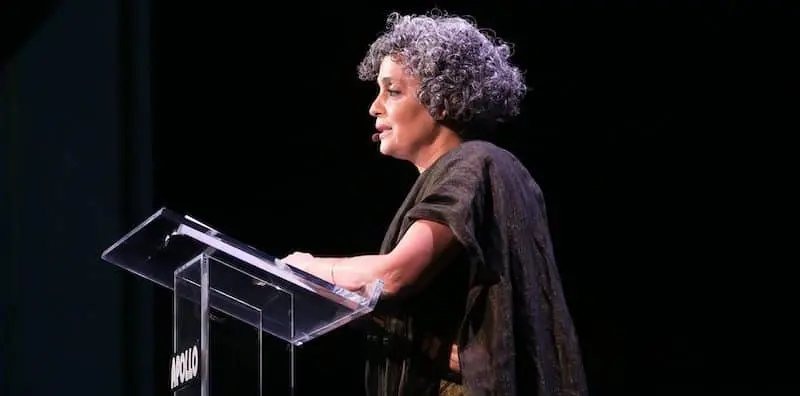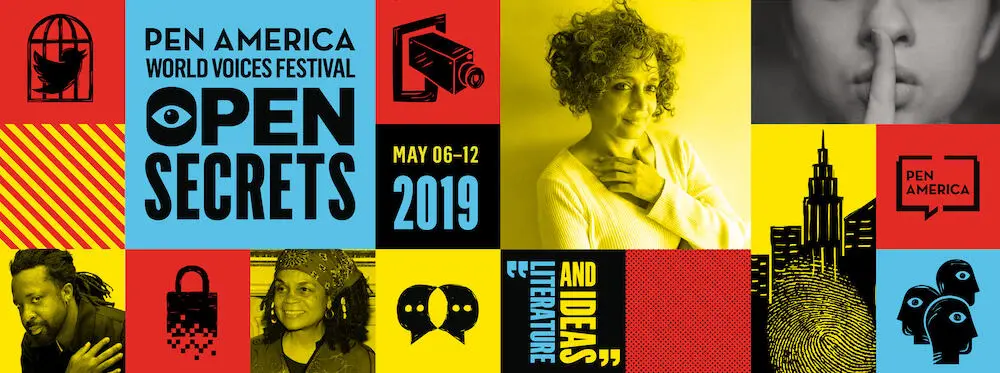By: Chip Rolley
Just a week ago, last Monday night, the 2019 PEN America World Voices Festival kicked off with two stellar events. At Cooper Union we had a foretaste of what a surprising and stimulating week we were in for when four brilliant talkers took to the stage to address the topic “Laws of Desire.” German journalist Carolin Emcke set the scene with a short reading from her book How We Desire, the essay that inspired the event.
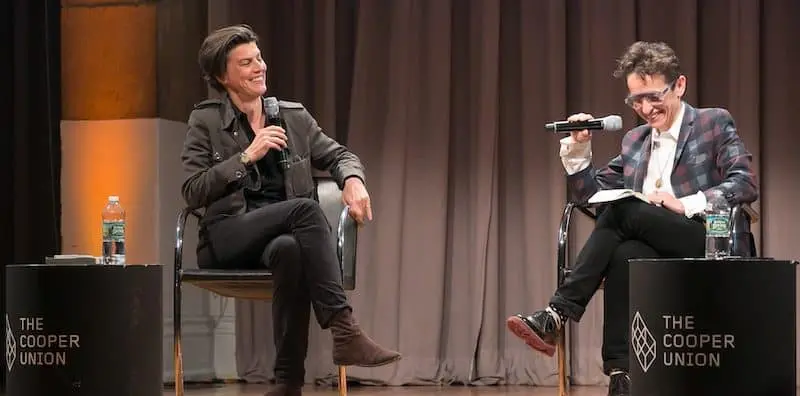
What followed was two conversations that epitomized the very thing we sought to accomplish with this year’s theme, “Open Secrets”—writers taking very personal, private stories and placing them in the public arena, and creating an atmosphere of intimacy, empathy, and understanding. It was electric hearing choreographer Bill T. Jones speak about his search for love and acceptance as a gay man in the early eighties, to speak frankly about encounters at the St. Marks Baths, since closed, but at the time just a few doors away from the Cooper Union, and to extol the need to “be fierce” in the fight for living with dignity. Édouard Louis told the story of his first sexual encounter at the age of nine. Then Masha Gessen joined Emcke for a wide-ranging conversation that challenged the role gay identity plays in their writing.
The night underscored for me the magic of literary festivals. Unlike other performing arts festivals, we’re seldom working from a script. There’s no choreography, no libretto, and only the skeleton of an idea—a jumping off point for the writers to interact with spontaneity and glorious unpredictability. Who knew that Bill T. Jones would break into song as a way of answering a question? That was one of just many magical moments that characterized last week’s Festival. Later in the week Édouard Louis had his audience and fellow “Our Fathers” panelist Colm Tóibín in stitches when he demonstrated the “manly” way of sitting that his father had insisted was the hallmark of masculinity and what we today call “manspreading.” Crossing your legs was a sign of effeminacy, Louis’s father had declared. Tóibín hurriedly uncrossed his legs: “I’ve been outed!” he exclaimed.
Also on Monday night, just a few blocks away at the New School, a packed audience heard Tara Westover, author of the extraordinary memoir Educated, talk to Min Jin Lee who wrote the remarkable novel Pachinko. Just two days later, President Barack Obama recommended Pachinko on his spring reading list. He had already recommended Educated. Nice to know we’re on the same page as the former president.
Watch Tara Westover and Min Jin Lee in conversation at The Cost of an Education.
“Open Secrets” explored one of today’s hottest issues: the dissolving boundary between the public and the private in our literature, our politics, and our daily lives. To do this, we assembled an extraordinary line-up of writers, artists, and public figures and they did not disappoint. During the seven days of the Festival we were treated to so many moments of insight, revelation, and provocation.
We tackled the very tough subject of violence against women in Intimate Terrorism with an arresting multi-genre panel—poet Gerður Kristný, novelist Miriam Toews, and journalists Shiori Ito and Rachel Louise Snyder (whose just-released book No Visible Bruises inspired this session)—that had the audience riveted. We have had remarkable feedback about this session and will soon be able to share it with a wider audience via video.
Our exploration of the double-edged sword of the digital revolution included the political discussion Siri, Where’s My Democracy which brought together The Guardian’s acclaimed investigative journalist Carole Cadwalladr (who broke the Cambridge Analytica-Facebook scandal), The New Yorker’s Sue Halpern, and internationally recognized privacy expert Danielle Citron to examine the utopian potential against the often dystopian reality of the interaction of technology and politics. This was one of those sessions where the audience was arguably as informed and engaged as the panel and there were several memorable exchanges in the Q&A.
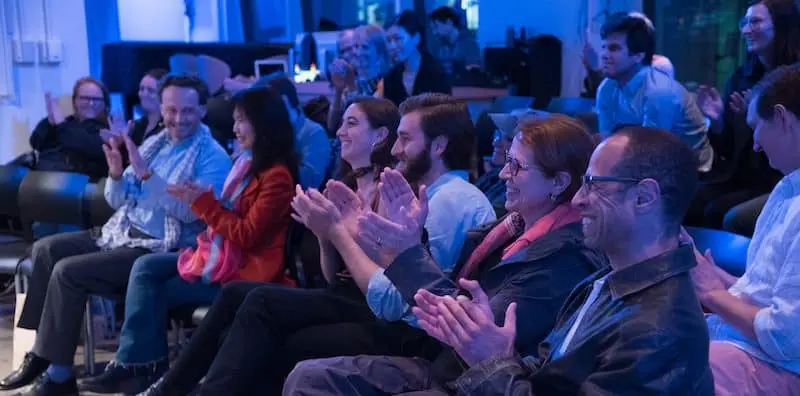
Similarly, an ardent audience packed the Brooklyn Historical Society’s beautiful auditorium to hear Shoshana Zuboff (author of the defining text The Age of Surveillance Capitalism) and writer Douglas Rushkoff (author of Team Human) in Surveillance Capitalism, Human Autonomy, and You, exploring the limits to free will and autonomy when every move we make is monitored and monetized.
The Big Chill: Creativity in the Era of Data Mining was a timely examination of how digital surveillance impacts creative expression with Recode Decode host Kara Swisher, novelists Dave Eggers and H.M. Naqvi, and students Ifeoma White-Thorpe and Iman Abdul.
All of us are aware of how the genres of literary memoir and personal testimony have flourished in recent years, partly as a result of a culture more attuned than ever to share everything (online and off line), but also due to an increased willingness by writers to share, and try to make sense of, profoundly personal experiences. The Festival exemplified this.
We were privileged to witness some powerful moments of personal disclosure, in some cases with writers saying they had never before told these stories in public and likely never would again. This occurred at Saturday night’s session, It Happened to Me, at SubCulture where six writers shared their harrowing stories of trauma, loss, and dislocation in presentations that ranged from Paul Tran’s powerful performance poetry about their childhood sexual abuse to Scholastique Mukasonga’s French-language account of the Rwanda genocide that took her entire family and Grace Talusan’s account of her years of abuse at the hands of her grandfather. I will always be grateful for the courage of these writers and honored by the trust they placed in us.
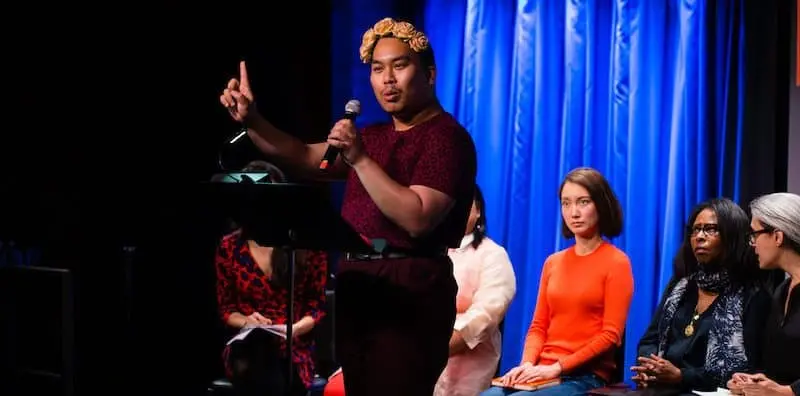
Likewise, in Secrets and Lives, writers Dani Shapiro (The Inheritance) and Bridgett M. Davis (The World According to Fannie Davis) engaged in an absorbing discussion about the secrets that defined their families. Spoiler alert: Bridgett’s mother supported her family by running numbers back when that was illegal, while Dani discovered just a few years ago that she was conceived via IVF and the man she had grown up believing was here father was in fact not.
We had many such moments of shared revelation and attempts to grapple with what should properly be private and what we need to know. It is an ongoing conversation, one that I hope to continue with you in future newsletters and by sharing recordings of many of the events.
This Festival explored the profoundly complex and challenging issues involved in this dissolution of the public and the private in more than 70 events of discussion, public address, poetry, readings, performance, and testimony.
We could not be prouder of this year’s lineup of exemplary novelists, playwrights, translators, journalists, and poets. They came from around the world—representing 50 different nationalities—joining the renowned American writers who were also in the program. Our guests included Marlon James, Tommy Orange (who has just won this year’s PEN/Hemingway award), Sheila Heti, Jennifer Egan, Rodrigo Fresan, Ma Jian, Raúl Zurita, Sonia Sanchez, Rodrigo Rey Rosa, Liao Yiwu, Jennifer Clement, Mohammed Hanif, Elif Shafak, Miriam Toews, Pajtim Statovci, Scholastique Mukasonga, Niviaq Korneliussen, Isabella Hammad, Morgan Parker, and many, many more. We partnered with Cave Canem to present tributes to Yusef Komunyakaa—events that were jam-packed with a who’s who of some of the most lauded poets alive today. Oh, and we had Patti Smith who spoke to the multitudes who gathered to see her memoir Just Kids declared the winner of the One Book One New York big read, organized by the Mayor’s Office of Media and Entertainment.
In Orwell’s China I scored one of three bucket-list opportunities provided to me by this Festival. At this session I was able to moderate the discussion with acclaimed novelist Ma Jian, in New York for the launch of his latest novel China Dream, and Leta Hong Fincher, author of Betraying Big Brother.
Another such moment had occurred the night before when the Festival honored the extraordinary moment in China, 30 years ago, when students led a mass uprising at Tiananmen Square and across China in favor of democracy only to have it brutally repressed by the military. I had expected that Rise Up: Tiananmen’s Legacy of Freedom and Democracy would be an uplifting evening of commemoration, readings, music, and political inspiration, especially as it was held in New York’s iconic Cathedral of St. John the Divine, a place of worship and of sanctuary for those in need.
But I was unprepared for the raw power of what happened in that hallowed space and how completely overwhelmed I—and I think everyone present—was.
I was not sure I would be able to speak after Liao Yiwu and Michael Day performed Liao Yiwu’s poem “Slaughter.” For those who have never seen one of Liao Yiwu’s performances of this work, it brings alive the unspeakable raw horror of what transpired on June 4 in 1989, and the trauma it inflicted on countless people. The performance was the first time I had heard it in English, by translator Michael Day, with Liao Yiwu accompanying on Tibetan bowl, abacus, and the xiao, and a kind of primordial howling that reaches you down in your gut. The combination of languages was an artistic triumph. (And while I am sure it’s not the first time the word “Fuck” has been uttered in the Cathedral, it might be the first time someone screamed it at the top of their lungs.)
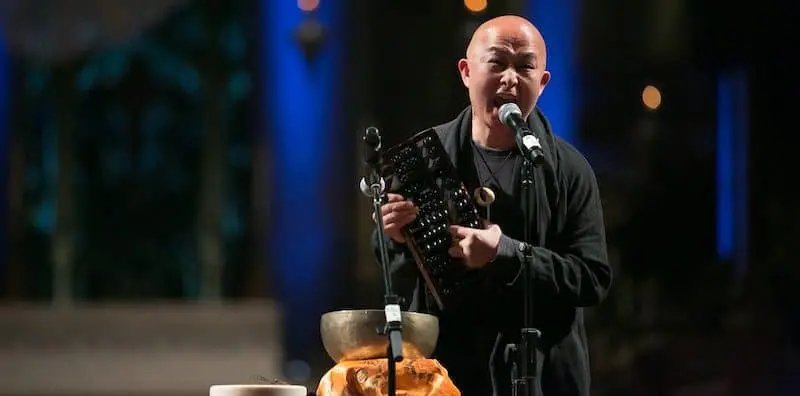
Fortunately we had an intermission right after that performance to give everyone a chance to recover. And then the Fogo Azul drum corps brought us to our feet, allowing us to continue, and to hear from a range of speakers making the connection between the activism 30 years ago and similar work across the world today.
We heard the words of Fang Zheng, who lost his legs when he was mowed down by a tank in 1989. Huang Xiang, one of the founders of the Democracy Wall movement, read and performed his poetry beautifully. And Humanitarian China founder Zhou Fengsuo summed up perfectly the purpose of our event, when he told the audience that as a student demonstrator, the period before the brutal crackdown on June 4 was the first time in his life he tasted freedom.
There were beautiful moments of lyricism too, with songs from Martha Redbone and Aaron Whitby, and Jesse Paris Smith. We heard a young dynamic speaker from Canada, Chemi Lhamo, who seems every bit the Tibetan community’s answer to AOC.
The evening concluded with Reverend William Barber, leader of the revival of Dr. Martin Luther King’s Poor People’s Campaign, and possibly the greatest orator alive today. Rev. Barber’s powerful address extolled the work of PEN America and brought to the fore the meaning of free expression and the role of writers to “reorder speech and shift the moral narrative.”
For the second year, our Festival included a day of programming for families and young adults, beautifully curated by Meg Lemke, and including Drag Queen Story Hour, the Spellbound theater group, Liniers, bookmaking with 826NYC, and so many others.
The PEN America Prison and Justice Writing program produced two events, one of which included specially commissioned work from incarcerated writers performed by leading American poets and writers.
The Artists at Risk Connection brought us the transgressive work of Nicaraguan performance artist Elyla Sinvergüenza in a world premiere work at BAAD! in the Bronx, and throughout the Festival we were captivated by the work from poets from Russia, Belarus, and Ukraine.
Other events featured the invaluable work of our Dreaming Out Loud program, our Worker Writers School program run by Mark Nowak, and the PEN America committees on Children’s and Young Adult Books, Translation, and Writers in Schools. Through our longstanding partnership with Frank Hentschker at the Graduate Center CUNY, the Festival featured staged readings of six plays from Berlin’s Gorki Theater.
And New York wasn’t alone in enjoying our world voices. Thanks to the smart curation of Natalie Green, Los Angeles scored great events with Mohammed Hanif and Scholastique Mukasonga,
And finally, I never thought I would ever hear myself saying the words, “. . . and now please welcome to the stage Arundhati Roy!” This was my third bucket-list moment of the Festival. I knew we were doing something very special when we decided to have the renowned author deliver the closing address of the Festival – the Arthur Miller Freedom to Write Lecture – at the legendary Apollo Theater. Yet I could never have predicted the electric atmosphere of that evening. Arundhati Roy set herself the task of addressing the role of literature in today’s world “at this moment when an era we think we understand—at least vaguely—is coming to a close . . . as we lurch into the future, in this blitzkrieg of idiocy, Facebook ‘likes,’ fascist marches, fake-news coups, and what looks like a race toward extinction.” She argued that literature provides shelter in these terrible times:
Novels can bring their authors to the brink of madness. Novels can shelter their authors, too.
As a writer, I protected the characters in The God of Small Things, because they were vulnerable. Many of the characters in The Ministry of Utmost Happiness are, for the most part, even more vulnerable. But they protect me. Especially Anjum, who was born as Aftab, who ends up as the proprietor and Manager of the Jannat Guest House, located in a derelict Muslim graveyard just outside the walls of Old Delhi. Anjum softens the borders between men and women, between animals and humans and between life and death. I go to her when I need shelter from the tyranny of hard borders in this increasingly hardening world.
Compelling. Incontestable. Thank you Arundhati Roy for bringing the New York portion of the 2019 World Voices Festival to such a perfect ending. You can read an abridged transcript of her speech here. Thank you to Kim Chan and the great team who produced, marketed, and co-curated the Festival, and thanks to all the sponsors and partners who made it possible.
